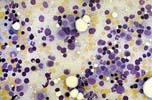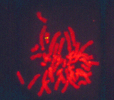Research Overview
A unique environment for graduate training in pathobiology and translational science…



Research Environment
The Department of Pathology and Laboratory Medicine provides an excellent environment for performance of research on varied topics related to mechanisms of disease pathogenesis. Research laboratories with affiliation to the Department of Pathology and Laboratory Medicine are housed in the Brinkhous-Bullitt Building, UNC Lineberger Comprehensive Cancer Center, Thurston-Bowles Building, the Neuroscience Research Center, the Mary Ellen Jones Building, MacNider Hall, Rosenau Hall, and the Francis Owen Blood Research Laboratories. Departmental and institutional support facilities include core laboratories for animal clinical chemistry and gene expression, animal models, biostatistics, DNA sequencing, flow cytometry, animal histopathology, microarray-based gene expression analysis, microscopy, oligonucleotide synthesis, proteomics and mass spectroscopy, tissue culture, and other core laboratories in the School of Medicine. In addition to these facilities, the UNC Lineberger Cancer Center offers a number of core facilities to support basic and clinical research. The faculty are associated with a number of different centers and programs housed within the UNC School of Medicine. Opportunities for collaborative and multidisciplinary research projects are numerous, among investigators from UNC-CH and investigators at nearby research facilities located in Research Triangle Park, including the National Institute of Environmental Health Sciences, the US Environmental Protection Agency, and numerous pharmaceutical companies.
Basic Research Funding
The University of North Carolina at Chapel Hill ranks in the top 15 nationally among institutions receiving research funds from the NIH. In 2008, UNC-CH was ranked 12th, with $343 million in NIH research funds. Likewise, the UNC School of Medicine is ranked in the top 15 nationally among medical schools receiving NIH research funds. In 2008, the UNC School of Medicine ranked 14th with $225 million in NIH funding. The Department of Pathology and Laboratory Medicine has a long history of competitively funded research programs. The sources of these research funds vary, with the bulk of the funds coming from competitively awarded research grants and contracts from the National Institutes of Health and other federal agencies. In addition, the UNC-CH Department of Pathology and Laboratory Medicine annually ranks among the top recipients of NIH research funds to pathology departments. The UNC-CH Department of Pathology and Laboratory Medicine ranked 26th in 2008 nationally among pathology departments receiving NIH research funds. In 2008, the UNC-CH Department of Pathology and Laboratory Medicine received $8.4 million in research funding from the NIH.
Funding for Ph.D. Students
Funding for Pathobiology and Translational Science Ph.D. students is derived from various sources within the Department of Pathology and Laboratory Medicine and the UNC-CH. Support for first-year students is provided by the Biological and Biomedical Sciences Program. Funding for students that join the Pathobiology and Translational Science Ph.D. Program may be derived from research funds of faculty members, Departmental funds, training grants, or other awards. Funding from the Department of Pathology and Laboratory Medicine includes the Bill Sykes Scholarship Award and the Wagner Scholars Program.
Numerous NIH-sponsored predoctoral training programs are available to support Pathobiology and Translational Science graduate students with the appropriate qualifications and research interests. The Integrative Vascular Biology Training Program is one such training grant closely aligned with the Pathobiology and Translational Science program. The goal of this program is to train students capable of solving problems in vascular disease in the post-genomic era, implementing an integrative approach to studies of complex model systems through multidisciplinary collaborations.
Research Faculty
The Department of Pathology and Laboratory Medicine at UNC-CH maintains an eclectic faculty in order to carry out diverse departmental functions, including a broad range of teaching responsibilities, active and diverse research programs, laboratory animal medicine services, hospital medical services related to clinical laboratory medicine, diagnostic and forensic pathology, surgical pathology, and cytology. Therefore, the primary focus and range of activities for individual faculty members vary, and may not include direct participation in graduate training or basic research. Nonetheless, these individuals represent valuable resources to the graduate students in pathology and other graduate programs at UNC-CH. For these reasons, we include among our Research Faculty the departmental faculty and the adjunct faculty members who directly or indirectly participate in graduate training. Detailed information on major research groups and research profiles of faculty members whose laboratories offer excellent research environments for training of graduate students can be found by following the links provided. Other faculty members from the Department of Pathology and Laboratory Medicine can be found in the Complete Listing of Pathology Faculty. Pathobiology and Translational Science basic research faculty are associated with a number of other centers and programs located at UNC School of Medicine, enhancing opportunities for productive collaborations in research.